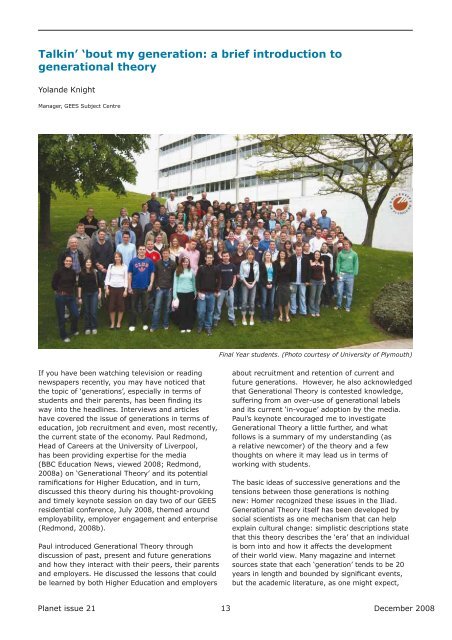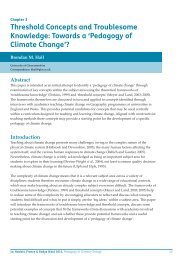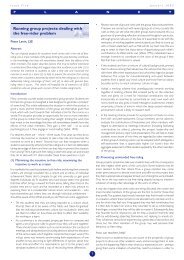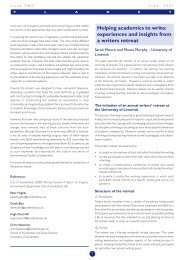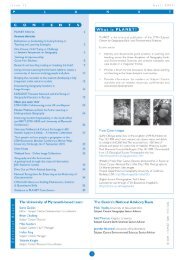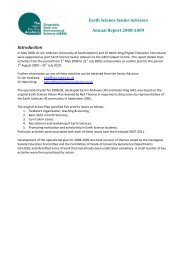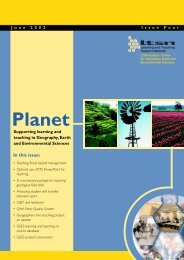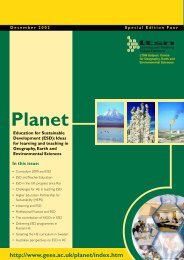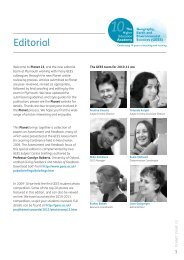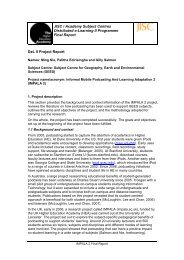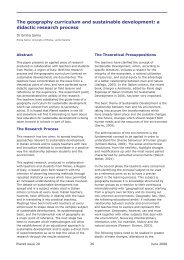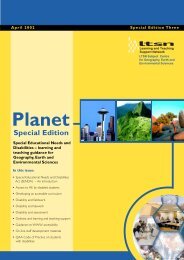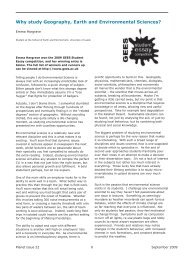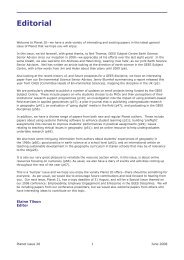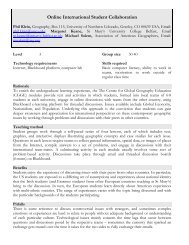Talkin' 'bout my generation: a brief introduction to generational theory
Talkin' 'bout my generation: a brief introduction to generational theory
Talkin' 'bout my generation: a brief introduction to generational theory
Create successful ePaper yourself
Turn your PDF publications into a flip-book with our unique Google optimized e-Paper software.
Talkin’ ‘bout <strong>my</strong> <strong>generation</strong>: a <strong>brief</strong> <strong>introduction</strong> <strong>to</strong><br />
<strong>generation</strong>al <strong>theory</strong><br />
Yolande Knight<br />
Manager, GEES Subject Centre<br />
<br />
If you have been watching television or reading<br />
newspapers recently, you may have noticed that<br />
the <strong>to</strong>pic of ‘<strong>generation</strong>s’, especially in terms of<br />
<br />
way in<strong>to</strong> the headlines. Interviews and articles<br />
have covered the issue of <strong>generation</strong>s in terms of<br />
education, job recruitment and even, most recently,<br />
the current state of the econo<strong>my</strong>. Paul Redmond,<br />
Head of Careers at the University of Liverpool,<br />
has been providing expertise for the media<br />
(BBC Education News, viewed 2008; Redmond,<br />
2008a) on ‘Generational Theory’ and its potential<br />
<br />
discussed this <strong>theory</strong> during his thought-provoking<br />
and timely keynote session on day two of our GEES<br />
residential conference, July 2008, themed around<br />
employability, employer engagement and enterprise<br />
(Redmond, 2008b).<br />
Paul introduced Generational Theory through<br />
discussion of past, present and future <strong>generation</strong>s<br />
and how they interact with their peers, their parents<br />
and employers. He discussed the lessons that could<br />
be learned by both Higher Education and employers<br />
about recruitment and retention of current and<br />
future <strong>generation</strong>s. However, he also acknowledged<br />
that Generational Theory is contested knowledge,<br />
suffering from an over-use of <strong>generation</strong>al labels<br />
and its current ‘in-vogue’ adoption by the media.<br />
Paul’s keynote encouraged me <strong>to</strong> investigate<br />
Generational Theory a little further, and what<br />
follows is a summary of <strong>my</strong> understanding (as<br />
a relative newcomer) of the <strong>theory</strong> and a few<br />
thoughts on where it may lead us in terms of<br />
working with students.<br />
The basic ideas of successive <strong>generation</strong>s and the<br />
tensions between those <strong>generation</strong>s is nothing<br />
new: Homer recognized these issues in the Iliad.<br />
Generational Theory itself has been developed by<br />
social scientists as one mechanism that can help<br />
explain cultural change: simplistic descriptions state<br />
that this <strong>theory</strong> describes the ‘era’ that an individual<br />
is born in<strong>to</strong> and how it affects the development<br />
of their world view. Many magazine and internet<br />
sources state that each ‘<strong>generation</strong>’ tends <strong>to</strong> be 20<br />
<br />
but the academic literature, as one might expect,<br />
Planet issue 21 13<br />
December 2008
uilds a more uncertain and complicated picture. Karl<br />
<br />
investigate the development of <strong>generation</strong>al values,<br />
specifying that a ‘<strong>generation</strong>’ is not simply a cohort<br />
clustered by a bounded year of birth, but is a group<br />
of contemporaries who share a his<strong>to</strong>ry and a set of<br />
experiences that have marked their formative life.<br />
<br />
lead <strong>to</strong> the recognition of an actual <strong>generation</strong>: for<br />
that <strong>to</strong> occur, Mannheim suggests that there needs <strong>to</strong><br />
be an active recognition of these experiences by the<br />
potential <strong>generation</strong>. Being born in the right place,<br />
and experiencing certain events, does not necessarily<br />
<br />
There are also differences between apparently<br />
<br />
(Diepstraten, 1999) and Western context: that is,<br />
the discussion of <strong>generation</strong>s needs <strong>to</strong> acknowledge<br />
geographical differences. For example, popular<br />
Generational Theory in the U.S. sees dramatic<br />
changes following on from 9-11. ‘The Homeland<br />
Generation’ is now a term used by both recruitment<br />
<br />
is not used in other countries. North American<br />
researchers Strauss and Howe (1991) <strong>to</strong>ok the<br />
work of Mannaheim further by not only looking<br />
at how events in his<strong>to</strong>ry can mold a <strong>generation</strong>,<br />
but also by investigating the concept that these<br />
<strong>generation</strong>s themselves might mold his<strong>to</strong>ry. The<br />
structure developed by these authors consists of<br />
a cycle of ‘secular crisis’ and ‘spiritual awakening’,<br />
with four recurring <strong>generation</strong>al types (idealistic,<br />
reactive, civic and adaptive) travelling through their<br />
life cycles (from ‘youth’ <strong>to</strong> ‘elder’) over that period<br />
of time.<br />
In Strauss and Howe’s take on Generational Theory,<br />
the ‘crisis’ and ‘awakening’ events in his<strong>to</strong>ry<br />
affect the <strong>generation</strong>s living through them: those<br />
<strong>generation</strong>s will then go on <strong>to</strong> shape the next cycle<br />
of ‘crisis’ and ‘awakening’ events. This extension<br />
of Generational Theory is controversial, with both<br />
sociologists and his<strong>to</strong>rians.<br />
So, according <strong>to</strong> current literature, who are the<br />
current <strong>generation</strong>s active in UK Higher Education<br />
and how, in <strong>brief</strong>, can Generational Theory help<br />
in understanding and developing the student<br />
experience?<br />
Paul Redmond’s GEES keynote acknowledged<br />
the <strong>generation</strong>al tags which are currently used in<br />
popular UK culture: the Baby Boomers, Generation<br />
X, Generation Y and the Millennials. The keynote<br />
audience itself consisted of ‘Boomers, Generation X<br />
and Y: the Millennials are either about <strong>to</strong> start school<br />
or have not yet been born. Table 1 summarizes<br />
some of the peer characteristics of the three main<br />
<strong>generation</strong>s active in UK HE <strong>to</strong>day (Redmond 2008b;<br />
Strauss and Howe, 1991).<br />
Much of what has been discussed so far may seem<br />
like common-sense: there is and always will be<br />
Boomers 1943-1960.<br />
Lecturers & parents of<br />
students. Some students.<br />
Generation X 1961-1981.<br />
Lecturers & parents of<br />
students. Some students.<br />
Generation Y 1982-2001.<br />
Students.<br />
Largest <strong>generation</strong> in his<strong>to</strong>ry<br />
35% of the current workforce<br />
<br />
Ethos: hard work, loyalty, rewards,<br />
‘making things’<br />
Family- orientated<br />
Currently comprise 87% of all CEOs<br />
and senior management<br />
<br />
Woody Allen)<br />
Blurring of traditional boundaries<br />
End of Cold-War certainties<br />
Lack of clarity in the world around<br />
them<br />
Loyal <strong>to</strong> profession, not employer<br />
Grew up during a time of strong<br />
political leadership<br />
Used <strong>to</strong> a ‘service econo<strong>my</strong>’<br />
Largest group now in the workforce<br />
<br />
Worried about work-life balance<br />
Digital immigrants<br />
Connected 24/7: a knowledge<br />
econo<strong>my</strong><br />
<br />
optimistic<br />
Bored by routine<br />
Entrepreneurial and goal-orientated<br />
Want men<strong>to</strong>rs, not bosses<br />
Career means a ‘cause’, not money<br />
<br />
fairness<br />
Work-life balance more than just a<br />
buzz word<br />
Digital natives<br />
<br />
Planet issue 21 14<br />
December 2008
<strong>generation</strong>al shift. So why is it suddenly so important<br />
and taking up so much media time? Paul Redmond’s<br />
keynote contextualized Generational Theory with<br />
respect <strong>to</strong> employers and recruiters and how they<br />
are currently viewing Generation Y. Some recruiters<br />
argue that <strong>generation</strong> Y is proving <strong>to</strong> be cynical<br />
about large organizations, leading <strong>to</strong> a ‘disconnect’<br />
between this <strong>generation</strong> and mainstream employers.<br />
As a result, the issue of <strong>generation</strong>al succession and<br />
how this might be dealt with is at the forefront of<br />
recruiters’ and employers’ thoughts: this affects the<br />
perceived employability of students and so has an<br />
effect on what students want from their time in HE.<br />
Therefore, whatever we, as the GEES HE community,<br />
may think about Generational Theory, employers and<br />
recruiters are paying attention <strong>to</strong> it.<br />
<br />
<br />
In conclusion, it could be recognized that<br />
Generational Theory, taking in <strong>to</strong> account its<br />
contested nature, has a role both in developing<br />
relationships between staff and students in HE and<br />
in preparing students for the world of work. There<br />
are, however, a number of caveats that I think<br />
are worth highlighting here and may be worthy of<br />
further discussion at another time:<br />
<br />
A student cohort may well consist of a<br />
number of <strong>generation</strong>s. It will certainly<br />
consist of students from different cultural and<br />
geographical backgrounds who may not have<br />
the same <strong>generation</strong>al characteristics as their<br />
UK peers.<br />
References<br />
<br />
<br />
<br />
Although it can often be comforting <strong>to</strong> feel<br />
part of a <strong>generation</strong>al group, it can also be<br />
constraining: the use of <strong>generation</strong>al tags can<br />
leave individuals feeling labeled and boxed in.<br />
Recognition of <strong>generation</strong>al differences can<br />
be positive, as long as individual <strong>generation</strong>s<br />
do not ‘blame’ the incoming or outgoing<br />
<strong>generation</strong>s for these differences.<br />
Recognition of such differences can also go in<br />
both temporal directions: if Generation Y can<br />
gain an understanding of previous <strong>generation</strong>s,<br />
it can only help them in the world of work.<br />
I would like <strong>to</strong> encourage readers <strong>to</strong> listen <strong>to</strong> Paul’s<br />
keynote presentation if they have not already<br />
done so. It is available as audio and as a set<br />
of Powerpoint slides from the GEES SC website<br />
(www.gees.ac.uk) (Redmond, 2008b). I would<br />
also welcome your thoughts on this article, if you<br />
think it worth further consideration. Please feel<br />
free <strong>to</strong> email me with your thoughts and how, if<br />
appropriate, the GEES SC might take this <strong>to</strong>pic<br />
further in relation <strong>to</strong> not only employability and<br />
employer engagement, but learning, teaching and<br />
assessment as a whole.<br />
BBC Education News. ‘The Curse of the<br />
Meddling Parent’, http://news.bbc.co.uk/1/hi/<br />
education/7169429.stm Viewed 2008.<br />
Diepstraten et al. (1999) Talkin’ ‘Bout My<br />
Generation: Ego and Alter Images of Generations in<br />
the Netherlands, The Netherlands’ Journal of Social<br />
Sciences, 35 (2) pp. 91-109.<br />
Mannheim, K. (1952) The Problem of<br />
Generations. <br />
(Ed. Kecskemeti, P.), New York: Oxford University<br />
Press (pp. 276-322). Original publication in 1928.<br />
Redmond, P. (2008a) ‘Here Comes the Chopper’,<br />
Education Guardian http://www.guardian.co.uk/<br />
education/2008/jan/02/students.uk Viewed 2008.<br />
Redmond, P. (2008b)‘Talkin’ about <strong>my</strong><br />
<strong>generation</strong>!’ Generation Y and the challenge of<br />
graduate employability, Powerpoint presentation<br />
and audio recording, GEES SC Website http://www.<br />
gees.ac.uk/events/2008/ac08/ac08.htm<br />
Viewed 2008.<br />
Strauss, W. and Howe, N. (1991) Generations:<br />
<br />
Perennial, 1992 (Reprint)<br />
Yolande Knight<br />
Yolande.knight@plymouth.ac.uk<br />
Planet issue 21 15<br />
December 2008


